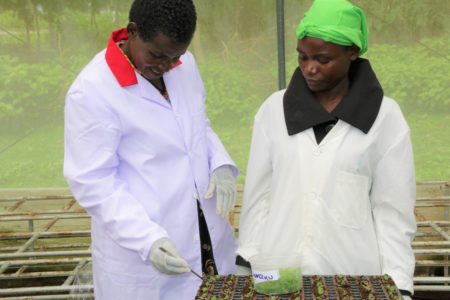In the village of Meru, in eastern Kenya, farmers are celebrating better potato harvests. In just the past two years, their harvests have increased from 10 tons per hectare to 28, bringing them close to the range of yields in most European countries (between 30-50 tons/ha).

Farmers credit the increase to higher-quality seed combined with improved agronomic practices. In the past, farmers used potatoes from the previous season’s harvest as seed, but these lead to sub-optimal yields as the quality is usually low, leading to gradual declines.
Farmers wanted higher-quality seed, but it wasn’t accessible:
“We knew we needed better seed, but it was too expensive for us because it had to be transported a long distance from the cities to our village,” says Joseph Muriuki a potato farmer in Meru. “Now that we produce quality seed close to home, we have more time to focus on attention and input on better agronomic practices.”
One person who stands at the middle of this transformation is Cecinta Nduru – a Village-based Potato Advisor, or VPA. Nduru was an early adopter of a process called “apical rooted cutting” to produce clean, high-quality potato seed. Now she produces her own seed and sells it to local farmers at a reasonable price because the transportation costs are minimal. The seed has helped local farmers increase their yields while Nduru makes extra income selling the seed. It’s a simple arrangement that could revolutionize potato farming in rural area throughout sub-Saharan Africa.
Nduru acquired her skills through USAID’s Feed the Future program, which supported the Kenya Accelerated Value Chain Development (AVCD) project. Prior to her training, Nduru was a ware potato farmer who rarely grew more than five bags of potatoes on her small farm, even during good rainfall seasons. She kept three bags for her family to eat and sold the other two, earning her too little income to support her children.
In the AVCD project, Nduru and other future VPNs learned tools and techniques from experts with the International Potato Center and Farm Inputs Promotions Africa. She and her classmates learned about soil testing, apical rooted cutting, fertilizers, crop rotation, and the basics on how to start a small enterprise.
“I might not have gone to school,” says Nduru, “But today I am a professor of potatoes!”

Credit: N. Ronoh (CIP)
After completing her AVCD training, Nduru set up her own nursery for seed potatoes. She obtains clean tissue culture plantlets from Stokman Rozen Limited, a private enterprise in Naivasha, about 320 kilometers from Meru. Once nested in soil, the plantlets continually produce shoots that are harvested, rooted in cocopeat plugs and sold as seed to farmers. Walking around her small nursery, Nduru takes pride in what she has learned and the proper state of her facility: “The tunnels [over the plantlets] keep out pests that are not good for the plant.”
Using apical rooted cuttings, she was able to produce seeds that lead to higher yields. News about Nduru’s seed potatoes spread quickly throughout Meru and her business has grown rapidly. Now she finds that demand for her seed potatoes exceeds her supply. In 2019, she had to set a limit of 50 kilograms of seed potato per customer.
While this seems like a good problem, Nduru worries it will force other farmers to return to older methods that produce lower yields. She is now focusing on growing her business to serve more people.
Currently Nduru produces 30,000 cuttings per season, but she has aspirations to sell 50,000 or more. Last year she earned USD 2,600 in sales. The extra income is enabling her to achieve many important goals.
“I have renovated my house with a new ceiling and floor and I built a new extension onto my house. I paid a connection fee for electricity and bought a television. I am so happy about this.”
NOTE: Nduru’s work is sponsored through USAID’s Feed the Future Kenya with technical support from the International Potato Center and the CGIAR’s research platform on Roots, Tubers and Bananas.
by Nathan Ronoh, Vivian Atakos and Monica Parker
